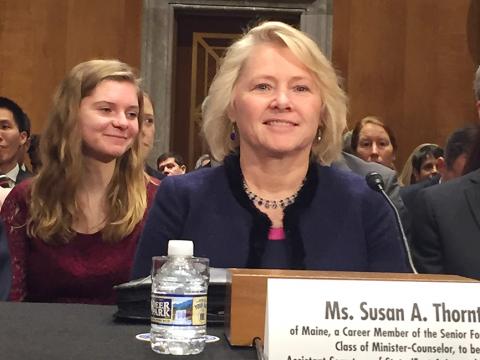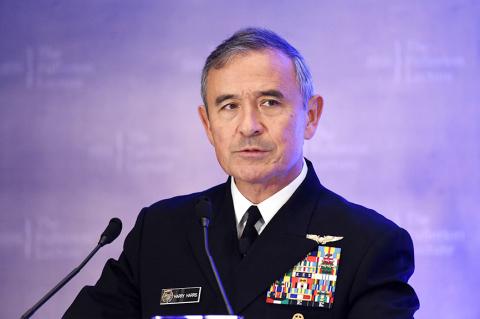The Ministry of Foreign Affairs yesterday reiterated that Taiwan’s status as an independent, sovereign state is a fact and the “status quo,” after a high-level US Department of State official said the removal of the Republic of China (ROC) flag from several US government Web sites was in line with Washington’s policy.
Ministry spokesman Andrew Lee (李憲章) said the government would continue to maintain this “status quo” and defend the nation’s democratic values and way of life.
However, Lee said Taiwan-US ties have progressed significantly over the past years thanks to the US’ Taiwan Relations Act, expressing confidence that bilateral relations would only grow stronger.

Photo: Nadia Tsao, Taipei Times
Lee made the remarks one day after US Senator Marco Rubio asked Susan Thornton, acting assistant secretary at the US Department of State’s Bureau of East Asian and Pacific Affairs, if she was aware of the disappearance of the ROC flag from the Bureau of Consular Affairs’ Web site last month.
Thorton told a meeting of the US Senate Committee on Foreign Relations that she was aware of the flag incident, but said the Bureau of Consular Affairs’ Web site was done through a contract and was not seen by her office.
“Following the publication, we don’t recognize, of course, Taiwan as an independent country and we don’t recognize the flag of the ROC as a country where we have official relations. Our policy is to not display the flag of the ROC on US official government Web sites,” Thornton said.

Photo: AFP
When Rubio asked whether it was a new policy, as the flag had been displayed before, Thornton said that not displaying the ROC flag was not a new policy.
Aside from the consular bureau, the State Department and the Office of the US Trade Representative also removed the ROC flag in September last year and last month respectively.
In other developments, Admiral Harry Harris, commander of the US Pacific Command (USPACOM), said at a meeting of the House of Representatives’ Committee on Armed Services on Wednesday that the US would continue to help Taiwan defend itself and that any attempt by China to force Taiwan into unification must be deemed unacceptable.
Taiwan’s open economy and prosperous, free and democratic society “reflect the shared values between Taiwan and the US,” Harris said.
While the US does not have diplomatic relations with Taiwan, “we maintain a substantive and robust relationship with the people of Taiwan based on the Taiwan Relations Act of 1979,” he added.
“In line with this policy, USPACOM will continue supporting Taiwan’s efforts to develop a credible, resilient and cost-effective deterrent and self-defense capability,” he said in a statement on the US military posture and security challenges in the Indo-Asia-Pacific region.
He said arms sales and training for the Taiwanese military are an important part of that policy and help ensure the preservation of Taiwan’s democratic institutions.
As China’s military spending and capability continue to grow every year, the ability of Taiwan to defend itself decreases, Harris said.
Against such a backdrop, “we must continue to help Taiwan defend itself and demonstrate US resolve that any attempt by China to force reunification on the people of Taiwan is unacceptable,” he said.
USPACOM has supported extensive security cooperation activities with Taiwan in the areas of air and missile defense, maritime security, logistics support and joint operations and training, he said.

SECURITY: As China is ‘reshaping’ Hong Kong’s population, Taiwan must raise the eligibility threshold for applications from Hong Kongers, Chiu Chui-cheng said When Hong Kong and Macau citizens apply for residency in Taiwan, it would be under a new category that includes a “national security observation period,” Mainland Affairs Council (MAC) Minister Chiu Chui-cheng (邱垂正) said yesterday. President William Lai (賴清德) on March 13 announced 17 strategies to counter China’s aggression toward Taiwan, including incorporating national security considerations into the review process for residency applications from Hong Kong and Macau citizens. The situation in Hong Kong is constantly changing, Chiu said to media yesterday on the sidelines of the Taipei Technology Run hosted by the Taipei Neihu Technology Park Development Association. With

CARROT AND STICK: While unrelenting in its military threats, China attracted nearly 40,000 Taiwanese to over 400 business events last year Nearly 40,000 Taiwanese last year joined industry events in China, such as conferences and trade fairs, supported by the Chinese government, a study showed yesterday, as Beijing ramps up a charm offensive toward Taipei alongside military pressure. China has long taken a carrot-and-stick approach to Taiwan, threatening it with the prospect of military action while reaching out to those it believes are amenable to Beijing’s point of view. Taiwanese security officials are wary of what they see as Beijing’s influence campaigns to sway public opinion after Taipei and Beijing gradually resumed travel links halted by the COVID-19 pandemic, but the scale of

A US Marine Corps regiment equipped with Naval Strike Missiles (NSM) is set to participate in the upcoming Balikatan 25 exercise in the Luzon Strait, marking the system’s first-ever deployment in the Philippines. US and Philippine officials have separately confirmed that the Navy Marine Expeditionary Ship Interdiction System (NMESIS) — the mobile launch platform for the Naval Strike Missile — would take part in the joint exercise. The missiles are being deployed to “a strategic first island chain chokepoint” in the waters between Taiwan proper and the Philippines, US-based Naval News reported. “The Luzon Strait and Bashi Channel represent a critical access

Pope Francis is be laid to rest on Saturday after lying in state for three days in St Peter’s Basilica, where the faithful are expected to flock to pay their respects to history’s first Latin American pontiff. The cardinals met yesterday in the Vatican’s synod hall to chart the next steps before a conclave begins to choose Francis’ successor, as condolences poured in from around the world. According to current norms, the conclave must begin between May 5 and 10. The cardinals set the funeral for Saturday at 10am in St Peter’s Square, to be celebrated by the dean of the College